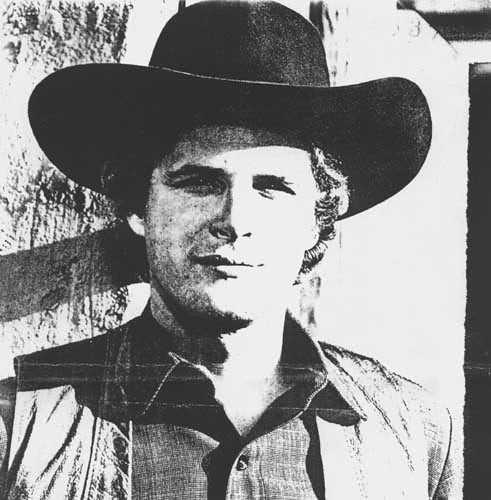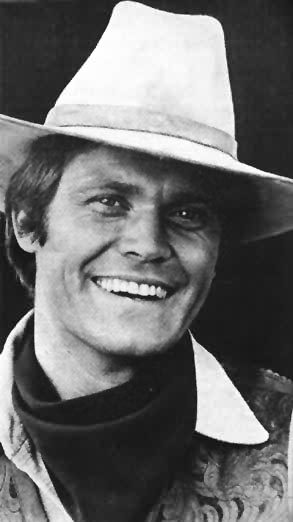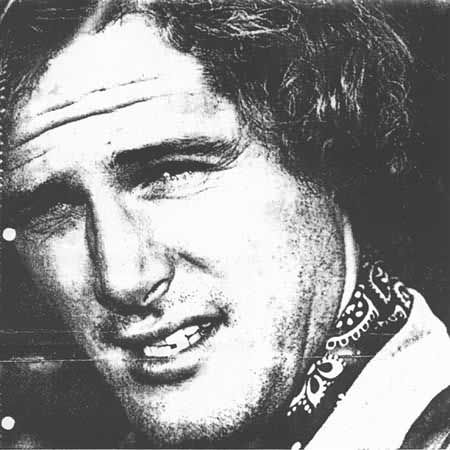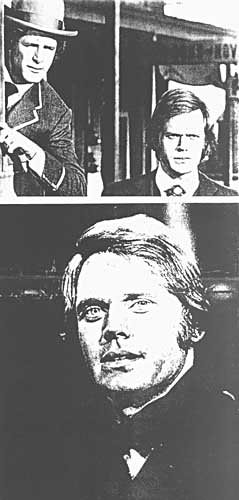- WITH
THE DEATH OF PETE DUEL THE SERIES TOTTERED,
- BUT IT OVERCAME THE HOLE
- By Lourdes Mateos
- Spanish Magazine, 1972 or 1973
 "Alcohol,
like drugs, is not a way to escape from a personal reality, but
rather a form of evading the daily routine and contact with a
hostile society," said Pete Duel--born Deuel, son of a small
town doctor--the solitary Pete, intelligent face, neurotic look.
It had been affirmed months after his death (New Year's Eve,
1971), years after he made a proposition--to himself--a five
year plan to triumph professionally. They say that he died from
a gunshot, that he killed himself. They say that he was murdered.
The truth is that the young life of Pete Duel, the circumstance
of his death, was filed by the Los Angeles Police Department
among the enormous police records, perfectly ordinary, an "accidental
death." One more mystery, concealed on a Saturday night,
when the loneliness of the days turns pathetic, without matizaciones.
"Alcohol,
like drugs, is not a way to escape from a personal reality, but
rather a form of evading the daily routine and contact with a
hostile society," said Pete Duel--born Deuel, son of a small
town doctor--the solitary Pete, intelligent face, neurotic look.
It had been affirmed months after his death (New Year's Eve,
1971), years after he made a proposition--to himself--a five
year plan to triumph professionally. They say that he died from
a gunshot, that he killed himself. They say that he was murdered.
The truth is that the young life of Pete Duel, the circumstance
of his death, was filed by the Los Angeles Police Department
among the enormous police records, perfectly ordinary, an "accidental
death." One more mystery, concealed on a Saturday night,
when the loneliness of the days turns pathetic, without matizaciones.
Pete Duel, actor, had proposed a goal
for himself. When he arrived, when his name was appearing at an
international level, after film failures, of tapes little aired,
television series of small account Pete felt nothing. Or he grieved
to feel awareness of his success. Or because it was not what he
had hoped of himself. Or for something much more simple that escapes
us and that he guarded in solitude, thus only living through his
books and favorite records.
One of the fundamental pieces of "Los
Dos Mosqueteros" or "Alias Smith and Jones" ceased
to exist, in spite of the strength of the production, of the foreseen
and unforeseen sales, of the simultaneous broadcasts by strong
and weak American and European television networks. Pete disappeared
when his mind was continuing to work on celluloid, when no one
yet knew why Hannibal Heyes and Kid Curry--known rogues, highwaymen,
train-and-bank robbers--had changed their names, sadly famous,
for those of Joshua Smith and Thaddeus Jones.
(The newspaper obituary read thus: He
was 31 years old. With Ben Murphy he formed the protagonist pair
of the two cowboys, Smith and Jones. His burial was attended by
more than a thousand "fans." Ben Murphy was so affected
by his death that he was not able to participate in the funeral.
Pete Duel's fiancée, Diane Ray, receiving the body at the
grave, in the Pacific Palisades [California] cemetery, read a
poem entitled "Love.")
 Life
Continues
Life
Continues
On 31 December 1972, the anniversary of
Pete Duel's death, Televisión Española broadcast,
within the program omnibus "Tarde para todos", the first
chapter of the series. It had been some time since "Los Dos
Mosqueteros" had said goodbye to the television audience.
The "suspense" had been maintained, but that Sunday
the ending arrived strangely combined: Judge Fulton and the governor--man
of modern ideas--decide to help the boys to remake their life
leaving them in freedom, with the condition the during a prudent
time--while the series lasts-- they don't get into messes.. If
all goes well the new Amnesty Law will apply to them, with which
they will obtain the honorable title of decent citizens.
In seventy-five minutes the outline remained
clear. Seventy-five minutes that welcomed the brunette figure
of Pete Duel, of Joshua Smith, of Hannibal Heyes for the last
time, when through past episodes, we already know the face and
act of the so-called "third musketeer", Roger Davis,
substituted for Pete.
Return
We already have a new shipment of chapters.
Televisión Española initiated their broadcast last
Sunday ("Tarde para todos") with the title "The
Most Dangerous Game In The West [The Biggest Game In The West]",
substituting in the scheduling for the "shows" of Dick
Van Dyke and James Stewart. Ben Murphy and Roger Davis return
to the same scenarios, with the contract under their arm, equal
to a good quantity of dollars to extenuate the twinges of raids
and horseback mountings. The American producers have an exact
vision of what the youth of their country need. They know how
to create heroes with new additions. "Los Dos Mosqueteros"
is a product of this type. In a "western" (Davis: "It
has been my favorite genre since I was a kid ___eso [CJC's Note: There's a splotch over the
first part of the word in my copy of the article.] , when they
offered me the role, I was able to accept it in an instant, without
having fear of cheating"), with transformed airs, sparkling,
up to date, to rely on some characters more than in the development
of an anecdote. Once studied the market offers the product that
the market demands. And the market asks for easy heroes, agreeable,
struggling gladly for regeneration, without excessive weight on
the part of the law, with a framework sufficiently ample in order
to enter and leave, in order to resolve the episode, the trick
that the scenario draws up for that episode. "The theme of
the sympathetic ‘bandit'--according to Cuadrado y F. Larrondo--
is continually hackneyed in film, and, naturally, it should not
be less so for television. Only that it is necessary to watch
over the forms on the small television screen, for many and various
reasons. The violence of the setting in the scene will be consciously
diminished and camouflaged following the guideline of the pilot.
The creator and producer of the series, Roy Huggins, explains:
"The series deals with characters of the West and in the
West, but in reality it is not a "western", but rather
adventures full of humor that unfold in "saloons" between
bandits and gunfighters." Exactly: to susti_ir
[CJC's Note: Another splotch.] the violence for the dialogue, the "strong
tone", for the intelligence; the bombastic appearance, for
the smile between impudent and ingenuous.
 Introverted
Ben
Introverted
Ben
When Ben Murphy played guest star roles
in big North American series, when Ben gave life to Joe Sample--assistant
to Farrell (Robert Stack)--in the series "Name of the Game",
when Murphy performed in films as important as "The Graduate"
or "Your, Mine and Ours"… the character of Kid
Curry-Thaddeus Jones was not in his mind, but, yes, he had the
immense desire to arrive at the top. This man, a Newman-Brando-O'Neill,
passed through five universities before coming to obtain a degree
in Political Science. Bad student, good reader, he found his true
profession: actor. The producers at Universal Studios--one of
the most powerful networks in the United States--have known how
to extract profit: physical and dramatically; of qualities, in
inverse order, tremendously important to the time to leave a cinematographic
footprint.
But the executive arm of "Los Dos
Mosqueteros" (in the original version: "Alias Smith
& Jones"), an incredible good shot, is an introverted
man in his real life. All the money that up to now he has earned
with the series he has invested to buy himself a luxurious apartment
near the television studios, that he has furnished himself with
all class of comforts. When Ben arrives home he feels so well
that he doesn't want to know anything from the outside. His best
society is constituted of 3,000 volumes of works of literature,
theater, poetry and novels. He is a big reader--with more knowledge
than in the University--and an avid student of oriental philosophies
and of all the religious movements of the Far East. "I scarcely
know anything. Compared with any university student of California,
I am a true ignoramus," but women all think the opposite:
"Ben is cultured, passionate, independent and with great
qualities of all types." Ben devotes himself to karate in
order to keep in shape.
 Davis
Opportunity
Davis
Opportunity
Before initiating the run, before rehearsals,
when the scripts were still fresh, Universal called together actors
of a meter and so many centimeters in height, with similar face,
with such age. To the audition went 50 aspirants for Smith and
Jones. At the end of exhaustive tests, the role of Jones went
to Ben Murphy. Another thing was to find the ideal Smith: not
able to be interpreted by just any actor, it deals with the central
character; it needed some physical, not vulgar, qualities and
some artistic talents above normal. The two final candidates were
actors of experience and strong formation: Pete Duel and Roger
Davis. [CJC's Note: To the best
of my knowledge, this is NOT true. According to Roger's own statements,
he did not even initially test for a role in AS&J.] Pete was chosen, Davis being hired as "speaker"
(his voice is the one that one hears in the original version:
the voice-presenter of the characters while they are appearing
on the credits). But to Roger his opportunity has arrived. His
name already figures in the billing. Solely because he has to
stand in, since inasmuch as to be a substitute has its problems.
More so when one is a substitue for a dead man who had left a
wake of sympathy and mystery. Business is business. Nobody is
indispensable. Sadly certain. LOURDES MATEOS.

Back to AS&J Articles List
or Pete Articles
List
 "Alcohol,
like drugs, is not a way to escape from a personal reality, but
rather a form of evading the daily routine and contact with a
hostile society," said Pete Duel--born Deuel, son of a small
town doctor--the solitary Pete, intelligent face, neurotic look.
It had been affirmed months after his death (New Year's Eve,
1971), years after he made a proposition--to himself--a five
year plan to triumph professionally. They say that he died from
a gunshot, that he killed himself. They say that he was murdered.
The truth is that the young life of Pete Duel, the circumstance
of his death, was filed by the Los Angeles Police Department
among the enormous police records, perfectly ordinary, an "accidental
death." One more mystery, concealed on a Saturday night,
when the loneliness of the days turns pathetic, without matizaciones.
"Alcohol,
like drugs, is not a way to escape from a personal reality, but
rather a form of evading the daily routine and contact with a
hostile society," said Pete Duel--born Deuel, son of a small
town doctor--the solitary Pete, intelligent face, neurotic look.
It had been affirmed months after his death (New Year's Eve,
1971), years after he made a proposition--to himself--a five
year plan to triumph professionally. They say that he died from
a gunshot, that he killed himself. They say that he was murdered.
The truth is that the young life of Pete Duel, the circumstance
of his death, was filed by the Los Angeles Police Department
among the enormous police records, perfectly ordinary, an "accidental
death." One more mystery, concealed on a Saturday night,
when the loneliness of the days turns pathetic, without matizaciones.
 Life
Continues
Life
Continues Introverted
Ben
Introverted
Ben Davis
Opportunity
Davis
Opportunity